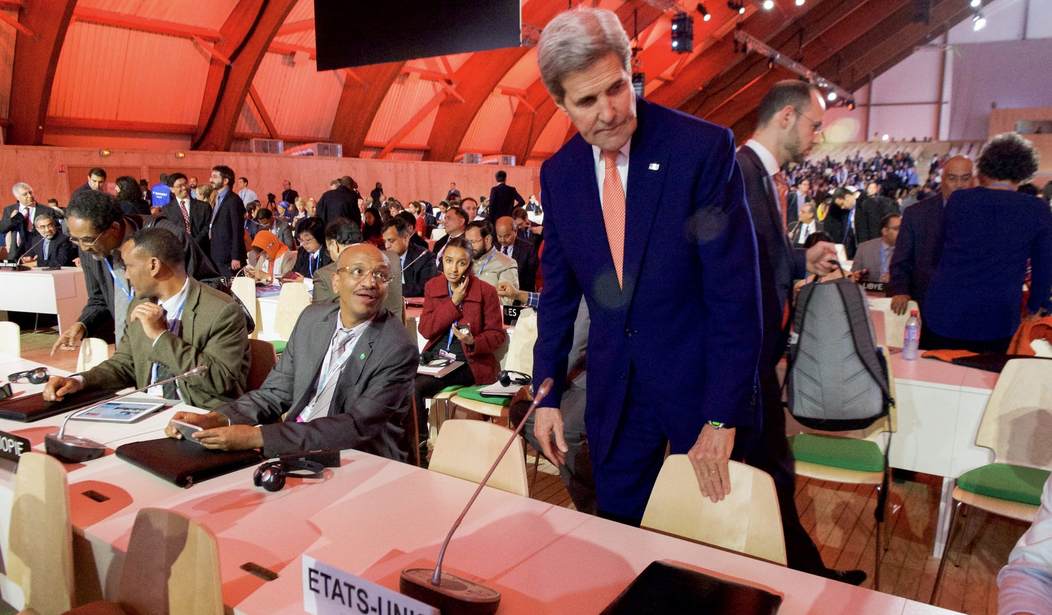President Obama stepped into the Cabinet Room of the White House this evening to declare that the climate agreement reached in Paris ensures “the world that we’ll leave to our children” is “a world that is safer and more secure, more prosperous, and more free” — thanks to “strong, principled, American leadership.”
“And that is our most important mission in our short time here on this Earth,” Obama added.
But the GOP leader of the Senate Environment and Public Works Committee called agreement of the Conference of Parties (COP21) pursuant to the United Nations Framework Convention on Climate Change “no more significant to the United States than the Kyoto Protocol announcement 18 years ago.”
Obama, who didn’t take questions from the press, began his victory lap by reminding all that “in my first inaugural address, I committed this country to the tireless task of combating climate change and protecting this planet for future generations.”
“Two weeks ago, in Paris, I said before the world that we needed a strong global agreement to accomplish this goal — an enduring agreement that reduces global carbon pollution and sets the world on a course to a low-carbon future,” he said. “A few hours ago, we succeeded. We came together around the strong agreement the world needed. We met the moment.”
The president stressed that “today the American people can be proud — because this historic agreement is a tribute to American leadership.”
“Over the past seven years, we’ve transformed the United States into the global leader in fighting climate change,” he said, listing some of the administration’s climate actions over the years. “…Now, skeptics said these actions would kill jobs. Instead, we’ve seen the longest streak of private-sector job creation in our history.”
“Now, no agreement is perfect, including this one. Negotiations that involve nearly 200 nations are always challenging. Even if all the initial targets set in Paris are met, we’ll only be part of the way there when it comes to reducing carbon from the atmosphere.”
According to the White House, the agreement “sets a goal of keeping warming well below 2 degrees Celsius” and “acknowledges that in order to meet that target, countries should aim to peak greenhouse gas emissions as soon as possible.” Countries that are party to the agreement — the administration boasted of “more than 190,” but even the highest polluters such as China and India get to make a “nationally determined contribution” to cut emissions — “will communicate their climate targets every five years, starting in 2020.”
“The Agreement puts in place a mechanism to assess collective progress on global mitigation action using the best available science,” adds the White House fact sheet. “This process will begin in 2018 and occur every five years to help inform countries’ future targets and strategies.”
Obama noted that “this agreement is ambitious, with every nation setting and committing to their own specific targets, even as we take into account differences among nations.”
“I believe this moment can be a turning point for the world,” he said. “…I imagine taking my grandkids, if I’m lucky enough to have some, to the park someday, and holding their hands, and hearing their laughter, and watching a quiet sunset, all the while knowing that our work today prevented an alternate future that could have been grim; that our work, here and now, gave future generations cleaner air, and cleaner water, and a more sustainable planet. And what could be more important than that?”
What could be more important, Environment and Public Words Chairman Jim Inhofe (R-Okla.) said, is an agreement that means something.
“This agreement is no more binding than any other ‘agreement’ from any Conference of the Parties over the last 21 years. Senate leadership has already been outspoken in its positions that the United States is not legally bound to any agreement setting emissions targets or any financial commitment to it without approval by Congress,” Inhofe said. “China, the largest carbon dioxide emitter will continue to emit for the next 15 years before even considering taking any action. India, the third largest emitter of carbon dioxide continues to condition its commitments on getting trillions of dollars from developed nations.”
“The ‘agreement’ calls for different standards of transparency between developed and developing countries and even expects that developed countries will set economy wide emission reduction targets while developing countries like China and India can play it by ear. What is significant for the United States is that we can expect the administration to cite this ‘agreement’ as their excuse for establishing emission targets for every sector of the U.S. economy not only including utilities, but petroleum refining, all manufacturing, agriculture, and others.”
Inhofe said administration officials, including from the Environmental Protection Agency and State Department, will be called before his committee to testify on the agreement early next month.
“Many questions have remained unanswered since the administration refused to testify in October to its plans to meet emissions reduction targets,” he said.
In Paris, Secretary of State John Kerry praised the agreement as one that “will help us transition to a global clean energy economy and ultimately prevent the worst, most devastating consequences of climate change from ever happening.”
“We are sending literally a critical message to the global marketplace. Many of us here know that it won’t be governments that actually make the decision or find the product, the new technology, the saving grace of this challenge. It will be the genius of the American spirit,” Kerry said. “It will be business unleashed because of 186 nations saying to global business in one loud voice: We need to move in this direction. And that will move investment. That will create new, greater research and development, and the next great product will come that will change our lives.”









Join the conversation as a VIP Member